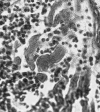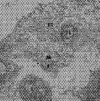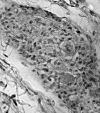Chagas disease
- PMID: 17148699
- PMCID: PMC2653922
- DOI: 10.1136/pgmj.2006.047357
Chagas disease
Abstract
Chagas disease is the clinical condition triggered by infection with the protozoan Trypanosoma cruzi. The infection is transmitted by triatomine insects while blood feeding on a human host. Field studies predict that one third of an estimated 18 million T cruzi-infected humans in Latin America will die of Chagas disease. Acute infections are usually asymptomatic, but the ensuing chronic T cruzi infections have been associated with high ratios of morbidity and mortality: Chagas heart disease leads to unexpected death in 37.5% of patients, 58% develop heart failure and die and megacolon or megaoesophagus has been associated with death in 4.5%. The pathogenesis of Chagas disease appears to be related to a parasite-induced mutation of the vertebrate genome. Currently, treatment is unsatisfactory.
Conflict of interest statement
Competing interests: None declared.
References
-
- Teixeira A R L, Soulsby E S L. The Stercorarian trypanosomes. Immunopathology, immunoprophylaxis. In, ed. Immune responses in parasitic infections: immunology Boca Raton, FL, CRC Press 1987125–145.
-
- Chagas C. New human trypanosomiasis. Morphology and life cycle of Schyzotrypanum cruzi, the cause of a new human disease. Mem Inst Oswaldo Cruz 19091159–218.
-
- Chagas C. A new human disease. Summary of etiological and clinical studies. Mem Inst Oswaldo Cruz 19113219–275.
-
- Carcavallo R U, Jurberg J, Galindez Giron I.et alAtlas of Chagas' disease vectors in the Americas. Rio de Janeiro: Editora FIOCRUZ, 1997
Publication types
MeSH terms
Substances
Grants and funding
LinkOut - more resources
Full Text Sources
Medical













